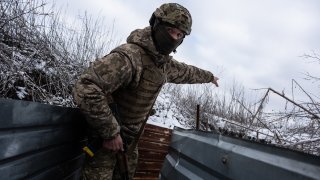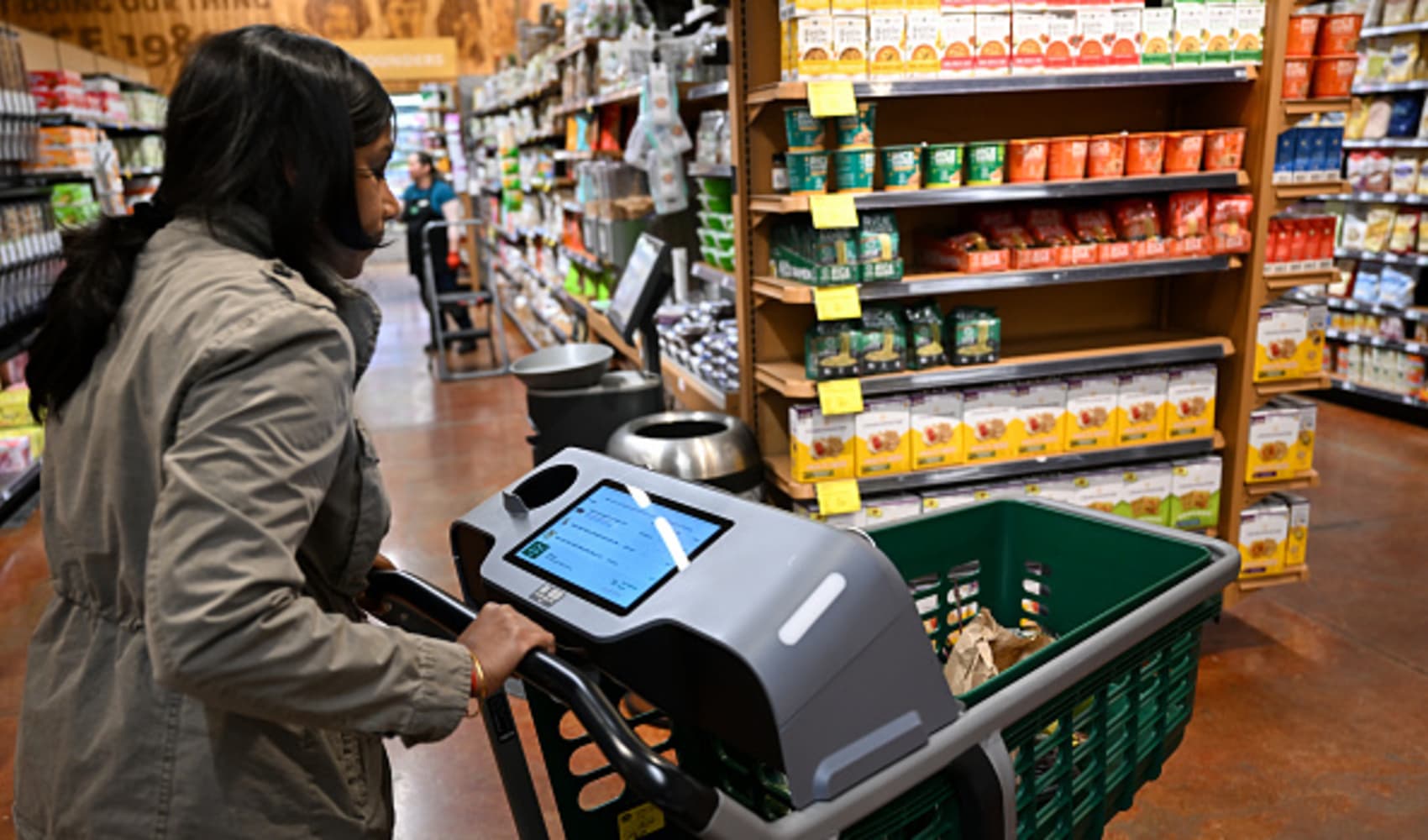
- As global powers have scrambled to prevent all-out war between Ukraine and Russia, Germany has been accused of actively failing to help defend Ukraine from a possible attack.
- Germany has refused to send military hardware to Ukraine, unlike other countries.
- Ukraine is not a member of the EU or NATO and Germany has a conundrum over its dynamics with Russia when it comes to energy.
As global powers have scrambled to prevent all-out war between Ukraine and Russia, Germany has been accused not only of failing to take a leadership role in diplomatic efforts, but also of actively failing to help defend Ukraine from a possible attack.
The U.S. and U.K. are among the countries that have send military hardware to Ukraine to help it defend itself in the case of an invasion. Russia denies it is planning such a move, despite mobilizing many tens of thousands of troops in the area.
Germany has refused to send help, however, and has reportedly blocked others from doing so. That has lead to accusations that it has not shown Ukraine — which is not a member of the EU or NATO but is geographically within Europe — enough solidarity.
Get Philly local news, weather forecasts, sports and entertainment stories to your inbox. Sign up for NBC Philadelphia newsletters.
Andrij Melnyk, Ukrainian ambassador to Germany, told CNBC on Monday that Germany has to "wake up" to the dangers facing Ukraine.
"We think that the world is becoming more dangerous and Germany, as the biggest European country and the strongest economic power, cannot allow itself to stay neutral and to go on sleeping and enjoying a comfortable life," he told CNBC's Annette Weisbach in Berlin.
"Germany has to wake up, Germany has to stand by its allies and Germany has to do much more for security in Europe and in this particular moment where a new war can break out in the heart of Europe, Germany has a special role to play."
Money Report
The ambassador added that Germany should join allies in sending defensive weapons to Ukraine and to "help prevent this new war that Russia is apparently playing."
Tensions have grown over recent months as Russia positioned around 100,000 troops along its border with Ukraine and moved around 30,000 troops to Belarus for military exercises. Trust in Russia is low following its 2014 annexation of Crimea from Ukraine, and support for pro-Russian separatists in eastern Ukraine.
Germany's Chancellor Olaf Scholz is expected to allay concerns over Berlin's stance towards Ukraine when he holds talks with U.S. President Joe Biden in Washington later on Monday, in his first trip to the U.S. since becoming chancellor.
Scholz has faced growing criticism over his perceived reluctance to weigh in so far and is under pressure to take a more robust position against Russia's President Vladimir Putin.
Instead of sending weapons to Kyiv, Berlin has instead offered to provide 5,000 protective helmets and a field hospital. This was met with disbelief and derision in some quarters of Ukraine.
Germany defended itself at the time saying it was responding to a request for military equipment, specifically helmets, according to Reuters. The Bild newspaper also reported that the German government had received a request from Ukraine which included a need for 100,000 combat helmets and tactical vests.
There have also been reports that Germany stopped Estonia from sending weapons to Ukraine, and Ukraine's defense minister has said that Berlin blocked Ukraine's attempts to procure weapons via NATO.
Because Ukraine is not a member of NATO, the military alliance is not obliged to defend it, but given its location — separating Russia and the EU — any confrontation has the potential to destabilize the whole region.
Speaking to German broadcaster RTL ahead of his meeting with Biden, Scholz defended Germany's record when it comes to defense spending (a longstanding bugbear of the U.S., which has criticized Germany for not reaching NATO-agreed defense spending targets) and its response to the Ukraine situation.
"We are very concrete, by the way, also in what we do for defense in NATO, in Europe. In the European Union, in continental Europe, we are the country with the highest defense contribution. Nobody should overlook that. In recent years, we have massively expanded the capabilities of the Bundeswehr [Germany's armed forces]. I even advocated this when I was still finance minister. And we will continue in this posture," Scholz told RTL.
Dr Christian Moelling, research director at the German Council on Foreign Relations, said Germany first has to "reassure our allies not on the economic side but on the political side, because the biggest thing is the political power of 30 nations behind NATO and also the power of the European Union."
Moelling conceded that Germany had been "caught in the cold" by the crisis and said it was now up to Scholz to "deliver something" in Washington.
"I hope that he's bringing a clear-cut commitment towards strengthening German forces in Lithuania in the Baltic region — and not just what is already in the books, because there's a routine replacement of forces — but I think the current situation requires a reassuring signal which means more forces," he said.
'Any day now'
Scholz's visit to Washington comes amid fears that a Russian invasion of Ukraine could be imminent.
White House national security advisor Jake Sullivan warned on Sunday that "any day now, Russia could take military action against Ukraine or it could be a couple of weeks from now, or Russia could choose to take the diplomatic path instead," he said in an interview on "Fox News Sunday."
Sullivan's comments come after two U.S. officials said Russia has in place about 70% of the combat power it believes it would need for a full-scale invasion of Ukraine. The number of battalion tactical groups in the border region has risen to 83 from 60 as of Friday and 14 more are in transit, according to Reuters.
Chancellor Scholz also reiterated that Germany will not supply lethal weapons to Ukraine, telling German broadcaster ARD "the German government has pursued a clear course for a long time: we never supply lethal weapons to crisis regions and are not supplying them to Ukraine."
"My predecessor [Angela Merkel] was committed to this course and it has been and will be right," he stressed, adding that opinion polls indicate that most Germans share the government's position on this matter.
"My duty is to do what is in the interests of the German people and what in this case is the point of view of our citizens," he noted.
Nord Stream 2
Germany has also come under fire for its continued support of the Nord Stream 2 project, a giant gas pipeline due to bring Russian natural gas supplies directly to Germany, bypassing a preexisting transit route via Ukraine.
German regulators have yet to approve the opening of the already-complete multi-billion dollar pipeline, which Scholz has described as a "private sector project" and not political. There have been calls for the pipeline to be abandoned, however, with the U.S. in particular stating that it jeopardizes Europe's energy security.
Thomas Benedix, senior portfolio manager, commodities at Union Investment, told CNBC on Monday that public opinion had shifted in Germany and that people did want to become more energy independent. However, this has been tempered by rising energy prices, he said, and the fact that Russia has in fact been a "very reliable" source of energy.
"It could be that, if we get a military escalation in the Russia-Ukraine conflict, then actually it will not be just a business decision to bring on Nord Stream 2. It could become more politicized, but our global strategists believe that a diplomatic solution is still more likely, with about a 60% chance, although that diplomatic solution will take a couple of months to play out in the end," he told CNBC's "Squawk Box Europe."






